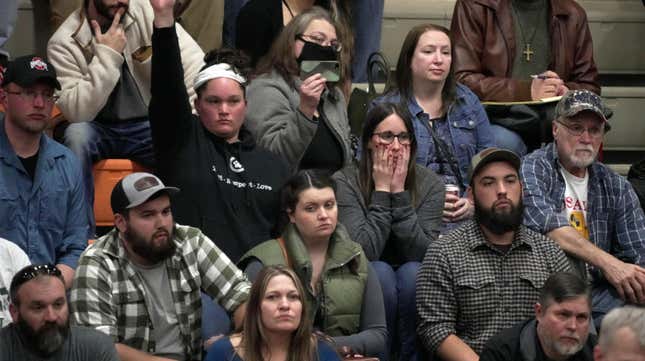Desperate Ohio Moms Speak Out on ‘Dehumanizing’ Response to East Palestine Disaster
"Do we have the flu? Do we have covid? Or are we dying from chemical poisoning?" one single mom told Jezebel in the wake of the toxic train derailment.
In Depth

Danielle Deal’s daughter has a cough. It’s not unusual for the 14-year-old, who’s plagued by seasonal allergies, to be sick this time of year. And yet, Deal is starting to worry. The single mother, a restaurant server, and her two daughters live just three miles north of where a Norfolk Southern freight train carrying hazardous materials—vinyl chloride, being one—derailed on February 3 in East Palestine, Ohio. Their home didn’t fall within the evacuation zone, nor could they afford to leave even if they wanted to. And every night since that plume of thick black smoke permeated the air, her daughter’s cough has felt a little more troubling than in years past.
“I didn’t want to be the person that runs to the doctor right away. I’m like, ‘This is just par for the course for her…she’s going to be fine…we’re going to get her some allergy medicine.’ But every day, it gets worse,” Deal told Jezebel over the phone. “Last night, she was up all night long coughing, so tonight, we’re going to urgent care after I get off work, and we’re going to see if it’s just her seasonal allergies. But we need to get that documented, because that’s what everybody’s saying needs to be done.”
Anecdotes like this underscore the uncertainty clotting in every corner of East Palestine and its neighboring towns. Whether local air and water is safe is just one item on a lengthy list of concerns. Amidst an influx of information—and misinformation—they say a lack of transparency by federal officials, Norfolk Southern, and the Ohio EPA is at the top of the list, too.
As residents like Deal continue to note headaches, persistent coughing, rashes, and irritated eyes—not to mention the sick animals—Ohio Gov. Mike DeWine (R) has repeatedly insisted that the chemicals that spilled into the Ohio River are no longer an issue. The soil is another story. Even still, those who can afford it are reportedly pursuing their own water screenings. Bull Creek, one of the waterways where thousands of fish were found dead in the immediate aftermath of the catastrophe, runs straight through Deal’s backyard. Her younger daughter loved to collect rocks, mushrooms, and wayward plants along its perimeter—but not anymore. Deal told me she hasn’t felt comfortable letting her dog outside, that she and her family have “rationed” shower use, and they continue to drink strictly bottled water, even using it for household chores.

“In East Waterford, we have one store, and it’s Dollar General,” Deal said. “It’s completely wiped out of supplies because the other local convenience stores in East Palestine and the other neighboring towns are shut down, or nobody wants to go there because it’s not safe. I talked to the cashier gentleman and he said they sold 140 cases of water in just a few days.”
On Tuesday, as if in response to residents’ speculation, DeWine and an EPA administrator drank the water out of a household tap in East Palestine. DeWine and the EPA also announced a plan of support, including opening a medical clinic for assessments, despite having issued dozens of statements insisting that air and water testing hasn’t shown results of contamination. The clinic will not conduct blood or urine tests, nor prescribe medications. Toxicologists, nurses, and mental health professionals on staff will be present simply to discuss symptoms and make referrals.
Other federal officials haven’t exactly provided much comfort either. Secretary of Transportation Pete Buttigieg has been the subject bipartisan bashing for his own lack of action. FEMA, too, took two weeks to announce assistance. Even former president Donald Trump has waded into the murky waters. On Wednesday, he visited East Palestine and promised support for the local residents, as if he doesn’t already have a transportation safety record that discourages trust.
So of course, many citizens remain suspended in doubt and racked with anxiety. Deal and others cited how a recent town hall—wherein Norfolk Southern representatives were not in attendance and drinking fountains were notably locked—devolved into frenzy of questions that ranged from financial assistance (Norfolk Southern has claimed to have committed more than $5.6 million to the community) to how to feel safe in one’s home if one can’t afford to evacuate.
this legacy, the compounding and layers and layers of pollution on a community…they’re basically telling us they don’t give a shit about us.
“I hate to say it, but East Palestine is…it’s a working class town. We’re working class people,” said Deal. “We’re not over here with Ritz Carlton credit cards. I’m a single mother of these two girls, and I’m a server. I’ve served at restaurants my entire life. My income is day-to-day. It’s not even paycheck-to-paycheck. I live off of my tip money.”
-

-

-

-

-

-

-

-

-

-

-

-

-

-

-

-

-

-

-

-

-

-

-

-

-

-

-

-

-

-

-

-

-

-

-

-

-

-

-

-









































